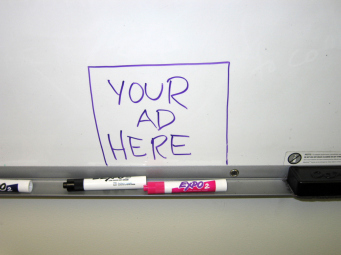I don’t work in online advertising any longer. But I was present at the creation (more or less), as a very early hire of Advertising.com. The pay-per-click, online advertising network ecosystem that company and others built almost 15 years ago needs to be replaced by something new. The creators of content, upon which everything depends, need to be more fairly compensated for web content as we know it to continue.
So says John Battelle, a leading authority on these matters, in a recent post. It’s an excellent read that give s a clear picture of the emerging trends in online advertising, and how the entire ecosystem depends on millions of us producing content for harvesting and reselling.
That’s one of the most important points for me in the piece. As I talked about recently looking at Twitter’s expanded advertising offerings, the online world has redefined the concept of “talent.” I’m the talent, you’re the talent, we’re all the talent.
We all create the content that Twitter, Google, Facebook and a few others turn into what Battelle calls “native ad units” and resell. In return, web publishers are sent traffic. That exchange increasingly is untenable according to Battelle:
A new generation of “native” ad units are on the rise, which live primarily on large social sites that curate and aggregate content. Examples include Twitter, Facebook, Tumblr and of course the grandaddy of them all, Google’s AdWords. Big sites like HuffPo and fast social comers like BuzzFeed are also employing native units. Pinterest is expected to roll out something similar soon.
* With the notable exception of Google’s AdSense (which is essentially a programmatic machine, see below), none of the other large “native” platforms help independent content creators make money, other than a “quid pro quo” deal that if those content creators engage with the platform, they’ll earn traffic back to their sites.
* These publishers hope that by accepting this quid pro quo, they will drive traffic to their site that they can then monetize with display advertising. However, as I stated before, this model is breaking down. Why?
On the buying side, advertising is increasingly sold via what Battelle calls “Demand Side Platforms,” not people. These automated exchanges are very efficient and do an excellent job of matching up buyers and content, and publishers can make some money. But not enough money, since these companies like AppNexus and Turn also drive down the price paid for ad space.
In the current model of online advertising the big content curators prosper, as do the automated exchanges. What about the content creator, who is producing the raw material that this online engine runs on?
If we don’t figure out better models for how to get the “content creator” paid, we risk losing the oxygen that feeds the web ecosystem. After all, what would Google, Twitter, Facebook, or Pinterest be without harvesting the hundreds of thousands of pieces of great content created every day on the web? Ditto for the DSPs, which depend on inventory created by these same independent content creators.
This is an interesting and provocative question. I’ve written regularly about the online quid pro quo on a more micro level — how consumers receive free online tools and apps in exchange for having their online behavior tracked and analyzed. Twitter and Facebook are fun, useful and free. So if they can harvest and repackage content from the casual user, good for them.
For the small online publisher though, Battelle is right on the mark. I’m about to experience the current system first hand, by signing up this site with Lijit Networks, which is owned by Battelle’s Federated Media. Of course, I don’t expect advertising on Work, Wine and Wheels to pay the bills.
For online publishers who want to make a living at their craft, the current system is grim. I enjoy what Battelle calls the “Independent Web” very much, and hope a better business model develops.
For direct email subscription see below.
